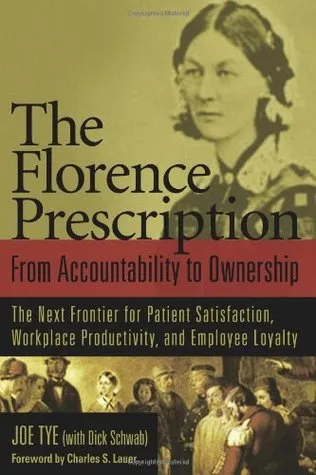The Florence Prescription: From Accountability To Ownership

Navigating Accountability to Ownership: Insights from "The Florence Prescription" by Dick Schwab and Joe Tye
A Prescription for Workplace Culture
In the bustling world of healthcare, where the balance between accountability and ownership can be delicate, "The Florence Prescription" by Dick Schwab and Joe Tye offers a refreshing perspective. This book is not just a prescription for healthcare professionals but a guide for anyone seeking a culture shift from mere accountability to true ownership. As someone who has experienced the dynamics of a hospital environment, this book became a beacon of wisdom in understanding the transformative power of ownership.
A Hospital Tale
My introduction to "The Florence Prescription" came during a stint as a volunteer in a local hospital. Amidst the beeping monitors and hurried footsteps, the book caught my eye on a nurse's desk. Intrigued, I borrowed it, and little did I know, it would become a valuable guide in navigating the intricacies of healthcare culture.
Florence Nightingale's Legacy
The book draws inspiration from Florence Nightingale, the pioneer of modern nursing. Her commitment to patient care goes beyond mere responsibility; it reflects a profound sense of ownership. Schwab and Tye explore how adopting a similar mindset can revolutionize healthcare organizations and, by extension, any workplace.
Personal Touch
As I read about Nightingale's tireless efforts to improve patient conditions during the Crimean War, I couldn't help but draw parallels to the dedicated nurses I encountered during my volunteer work. Their commitment went beyond job descriptions; it mirrored the ethos of ownership espoused by Nightingale.
Shifting from Blame to Accountability
One key theme in the book is the shift from a blame-oriented culture to one centered around accountability. Schwab and Tye argue that true ownership involves taking responsibility for both successes and failures, fostering a culture where individuals feel empowered to contribute ideas and solutions.
A Lesson Learned
Reflecting on this shift, I recalled a situation where a medical error occurred in the hospital. Instead of the blame game that often follows, the team gathered to discuss openly, learn from the mistake, and collectively work on preventive measures. It was a tangible example of the power of accountability fostering a culture of continuous improvement.
The Power of Positive Deviance
"The Florence Prescription" introduces the concept of positive deviance—identifying individuals or teams within an organization who excel in certain aspects and using them as role models. This approach encourages a positive, ownership-driven mindset to spread organically.
Positive Deviance in Action
During my time at the hospital, I witnessed a nursing team that stood out for their exceptional patient-centered care. Their practices became a source of inspiration for others, illustrating how positive deviance can create a ripple effect, elevating the entire team's commitment to ownership.
The Three Ps: Purpose, Passion, and Performance
Schwab and Tye emphasize the importance of aligning personal and organizational purpose, fostering passion for the work, and, in turn, enhancing overall performance. The Three Ps serve as a compass, guiding individuals and teams toward a sense of purposeful ownership.
Passionate Pursuits
In a conversation with a nurse who had been serving for decades, I discovered her unwavering passion for patient care. Her dedication wasn't just a job—it was a calling. The Three Ps, as outlined in the book, resonated as I witnessed how purpose, passion, and performance intertwined in her daily endeavors.
Practical Tools for Transformation
"The Florence Prescription" doesn't just theorize about ownership; it provides practical tools and exercises to facilitate the transformation from accountability to ownership. These tools empower individuals and teams to actively participate in reshaping their workplace culture.
Ownership Workshops
The hospital I volunteered at organized ownership workshops inspired by the book. These sessions became forums for open dialogue, collaborative problem-solving, and personal reflection. The practical tools offered in the book served as catalysts for positive change and a shared commitment to ownership.
Conclusion: Owning the Future
"The Florence Prescription" isn't just a book; it's a call to action for anyone seeking a culture shift in their workplace. Schwab and Tye's insights, coupled with real-world examples, make it a valuable resource for leaders, employees, and change-makers aspiring to transform accountability into true ownership.
As I reflect on the lessons gleaned from this prescription for cultural change, I'm reminded that the journey from accountability to ownership is not just a professional transformation but a personal one. Here's to owning the future.